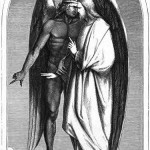We run our website the way we wished the whole internet worked: we provide high quality original content with no ads. We are funded solely by your direct support. Please consider supporting this project.

When God Wears Masks
At various times throughout the OT we find Yahweh assuming the role of a tester, refiner, punisher and even an enemy of Israel (e.g. Jer. 9:7; Lam. 2:5; Isa 63:10). Yet, when we examine these roles, or masks, in the light of the crucified Christ and the broader canonical witness, it becomes clear that these were roles God only reluctantly played.
In Jeremiah, for instance, we find the Lord declaring; “I will refine and test them, for what else can I do because of the sin of my people” (Jer. 9:7). Just as Joseph, out of love for his brothers, temporarily played the role of a harsh task-master over his brothers in order to test them and eventually lead them to repentance (Gen. 42), so God evidently was willing to assume “strange” and “alien” roles whenever doing so would benefit his people in the long run. Or, to draw an analogy from another biblical character, these passages suggest that God, like the apostle Paul, was willing to “become all things to all people” in order to further his purposes in the world (I Cor. 9:22).
Another example of God’s accommodating flexibility concerns the fact that, while OT authors frequently construe Israel’s relationship to Yahweh along the lines of a slave-master relationship, the Lord announced through Hosea that he dreamed of a future time when “you will no longer call me ‘my master’” but would instead “call me ‘my husband’” (Hos. 2:16). The implication, clearly, is that the master-slave relationship was not reflective of God’s true character and will. All divine portraits of Yahweh as a master over slaves must therefore be understood to involve an element of accommodation to the culturally conditioned, wounded and sin-stained way the former slaves he brought out of Egypt were inclined to view him. God was stooping to meet people where they were and to bear their sin in order to eventually bring them to the place he wanted them to be.
Yahweh’s dream for a husband-wife relationship, announced through Hosea, begins to be accomplished in a full way in the kingdom Jesus inaugurated. The Gospels present Jesus as the divine bridegroom who came looking for his bride (Mark 2:19) and the NT depicts all disciples as part of his collective “bride of Christ.” As ancient Jewish bridegrooms frequently did during the interval between the betrothal period and the wedding day, our heavenly bridegroom has gone to “prepare a place for us” (Jn. 14:2). And as betrothed women frequently did as they waited for their bridegroom to return, we who are “the bride” of Christ are to be in the process of making ourselves ready so when he returns, we’ll be a bride “without spot or wrinkle” (Rev 19:7). God’s age-long dream of setting aside the “master” mask and of acquiring a people who see themselves as his spouse rather than his servants is in the process of coming true.
Closely related to this, in Christ we find God setting aside the mask of a harsh “master” in order to relate to his people as a beloved friend. Echoing Yahweh’s words in Hosea 2:16, Jesus tells his disciples,
I no longer call you servants, because servants do not know their master’s business. Instead, I have called you friends, for everything that I learned from my Father I have made known to you (Jn 15:15).
So long as God had to stoop to wear the mask of a “master,” his “business,” as well as his true character, was kept somewhat concealed from his people. But now, in Christ, God has disclosed the heart of his “business”—the “mystery hidden from long ages past” (Rom. 16:25)—and with it, he has disclosed the true nature of his loving, other-oriented character.
Photo credit: Leonorah Beverly via Visualhunt.com / CC BY-NC-SA
Category: General
Tags: Bride of Christ, Character of God, Cruciform Theology
Topics: Attributes and Character
Related Reading

Podcast: How Do You Recommend Reading the Bible to Kids?
Greg looks at reading the Bible to kids and considers where in the Bible one should start reading. http://traffic.libsyn.com/askgregboyd/Episode_0311.mp3

What Does Spiritual Warfare Have To Do with the Cross?
Last week, we covered a few posts on the nature of the Atonement and the Christus Victor view. The following continues this theme, specifically looking the motif of spiritual warfare and how it relates to Christ’s work on the cross. This is an adaptation from Greg’s article in The Nature of the Atonement: Four Views. …

God Clearly Can, So Why Doesn’t He? (podcast)
Leah expects more from God. Should she? Greg confronts God’s inactivity and underperformance. Episode 510 http://traffic.libsyn.com/askgregboyd/Episode_0510.mp3

Love and the Other Attributes of God
If we keep our focus on Christ, we see that God’s power and God’s love are not two separate attributes, as many people assume. As I often state, love is not merely something God does; love is what God eternally is. Everything God does, therefore, expresses perfect love. God’s power, therefore, is simply an aspect…

Satan or God: Who Tempted David to Sin?
The author of 2 Samuel says that Yahweh caused David to sin by taking a census of his military personnel (2 Sam 24:1) while the author of 1 Chronicles attributes this temptation to Satan (1 Chr 21:1). It is clear that the author of 2 Samuel had no problem accepting that Yahweh was capable of…

The Reformers and the Centrality of Christ
The Christocentric nature of the Church’s hermeneutic approached a zenith in the Protestant Reformation. While Luther and Calvin rejected allegorical interpretation, in theory if not in practice, they nevertheless relied on typology and other creative hermeneutical strategies to discern how Christ was the subject matter of the OT. For Luther, Jesus was “the Word” in…
